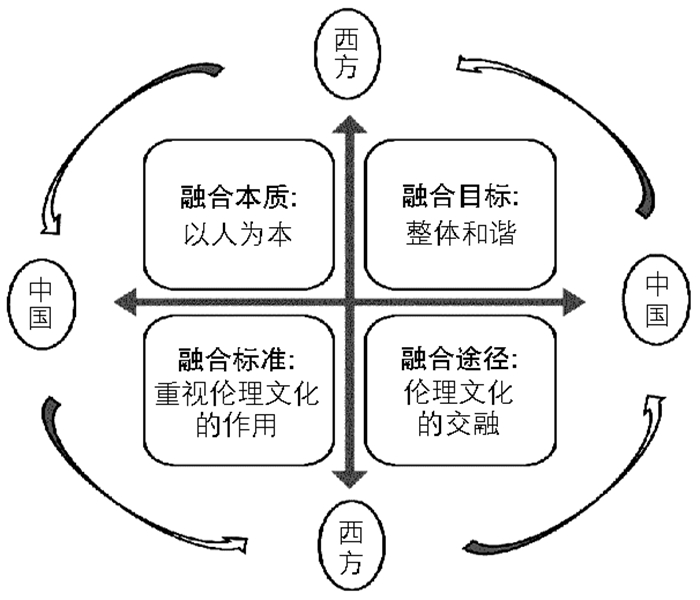-
尽管教育哲学家和其他教育家对教育中的伦理问题一直很感兴趣,但教师、教育管理者和其他教育机构工作人员的伦理却不是他们关注的焦点[1]。20世纪八九十年代以前,关于教师伦理的研究可谓寥若晨星,少量的研究也只是停留在哲学层面的探讨,难以形成系统的理论体系。究其原因:首先,对教师伦理感兴趣的研究者由于缺乏统一的动机,在研究时持有不同的目的和不同的方法;其次,与医学伦理或商业伦理不同,教师伦理研究并未受到社会公众的广泛关注,日新月异的技术变革也并未给教育领域带来像在医学或商业上那样的巨大变化,教师伦理研究缺少外力的推动;最后,由于时代以及理论发展的限制,早期研究者仅仅关注了宽泛的教育伦理研究,研究视角狭窄,且教育伦理因其具有内隐形、情境性、繁杂性、实践性等特点,研究过程非常漫长。然而,最近二十多年来,教育界出现了一个新的研究领域——教师伦理,其致力于探究教学的道德维度、道德方式、品格教育、教师专业伦理以及教师品性等。
教师伦理表现为“在以教学工作为核心的专业领域内,教师与同事、学生、家长及其他相关主体在进行专业交往时表现出的行为事实如何的规律与应该如何的规范”[2]。教师伦理蕴含着教育的专业价值和专业精神,引导着教师的专业自律,反映了教师共同体的道德担当,其重要性不言而喻。因此,本研究以CNKI、ProQuest Central以及Web of Science为文献数据来源,对教师伦理研究的相关成果进行梳理,总结和描述中西方不同文化背景下教师伦理研究的特点和内容,并对这一领域的未来研究发展趋势进行思考和展望。
全文HTML
-
西方国家对教师专业伦理的研究起步较早,相关研究具有相当的广度与深度,可分为以下几个时期:
第一,启蒙时期(20世纪50年代以前)。在西方,教育与伦理的最初关联可上溯到苏格拉底(Socrates)对“美德是否可教”的追问。到了18世纪末19世纪初,特别是教育学作为一门相对独立的学科出现之后,引发了学界关于道德是教育目的或是教育内容的探讨,伦理学逐渐成为教育学的理论基础。教育伦理学能独立出来,离不开杜威(Dewey)的巨大贡献。杜威(Dewey)不仅明确使用了“教育伦理学”这个概念,还出版了相关著作,如《教育伦理学六讲》《构成教育基础的伦理原则》等。这个时期关于教师伦理的研究尚未成为独立的研究领域,主要是通过间接地强调教育的目的、形式以及内容等来论述教师应有的教育行为,并没有出现直接探讨教师专业伦理及其规范的研究,主要代表人物有赫尔巴特(Herbart)、杜威(Dewey)、诺曼(Norman)、拉伊(Rye)等。
第二,萌芽时期(20世纪60至90年代)。受教师专业化运动的影响,教育伦理学也逐渐进入到一个多元化发展时期,在研究领域上不断分化出教师、课程、教学、政策等维度,教师伦理议题逐渐成为教育伦理学关注的中心。更重要的是,自杜威(Dewey)在《教育中的道德原则》中论证了教育方法的伦理性后,众多学者也开始逐渐涉足教师伦理研究领域。在此背景下,美国于1975年修改并完善《教育专业伦理规范》,反映了美国社会对教师职业的伦理期待。其他国家如日本、英国等也相继建立了相应的伦理规范与标准,对教师专业行为进行了详细规定,以此来指导本国教师的专业化发展,进而促进本国教育质量的提升。总体来说,这一时期关于教师伦理的研究多局限在教育伦理、教学道德或教学伦理等方面,教师伦理仍然没有取得相对独立的研究地位,主要代表人物有彼得斯(Peters)、罗杰斯(Rogers)、斯特里克(Strike)、索尔蒂斯(Soltis)等。
第三,发展和成熟时期(20世纪90年代至21世纪初)。20世纪90年代以来,西方对教师伦理的研究大多是基于理论与实践的角度,对教师行为的各个方面是否符合伦理道德的问题表现出了强烈的关注。具体表现在:(1)摒弃了从宏观的教育层面来研究教师伦理的方法,更加聚焦于教师教育教学过程中某个具体方面的伦理问题,如教学伦理、教师职业伦理、伦理型教师、教师与组织之间的伦理等;(2)侧重学生的道德培养、健康发展等问题,在对教师伦理规范的制定中突出强调学生的优先发展地位,如达尔西亚·纳瓦兹(Narvaez Darcia)倡议教师和学生应该建立一种安全的关系并形成关爱与信任的氛围,教师应致力于学术道德品质的培养[3];(3)讨论教育活动中有关伦理实践的问题,关注具体的教育活动,意在培养教师的道德素养、德行品格、伦理思维和行动策略等,如理查德·奥斯古索尔普(Richard D.Osguthorpe)就探讨了教师的道德素养和品质等问题,具体包括“我们为什么需要教师具备良好的素养和道德品格”“教师的道德品质需达到的水平标准”以及“如果教师缺少良好的道德品质会有什么后果”[4]。综上,这个时期西方关于教师伦理的研究逐渐深入,理论研究日益成熟。教师伦理的研究在国外已经是众多学者关注的焦点,并且形成了相当大的研究规模,主要代表人物有芬斯特马赫(Gary Fenstermach)、理查德·奥斯古索尔普(Richard D.Osguthorpe)、古德莱德(Ivor Goodlad)等。
第四,繁荣和多元化时期(21世纪初至今)。进入21世纪,教师专业伦理的研究呈现出繁荣与多元化的局面。研究者不仅丰富了研究视角(如应用伦理学与女性主义的视角等),还将研究领域拓展到伦理型教师、伦理型知识、教师道德、教学中的伦理判断和伦理困境等方面。其中,教师在教育实践中遇到的伦理矛盾和未来教师教育的发展是研究焦点。当下,西方国家对教师伦理困境的关注,一方面是为了强调教师要具有一定的伦理素养和知识,从伦理的角度审视其专业实践,另一方面是基于学生利益的考虑。例如:有研究者对伊朗英语教师在课堂评价中遇到的道德冲突进行了实证研究,发现教师对制度要求的看法与学生的需要之间经常发生冲突,因此建议伊朗教育组织修改现行的评价标准,以此缓解一些冲突[5];费德勒(Fiedler)等人把目光聚焦在特殊教育领域,指出教师在面对有特殊需要的学生时,经常遇到各种不同利益和需求的冲突,教育工作者只有依靠周全的伦理实践决策才能使残障学生利益获得最大保障[6]。
-
在21世纪之前,我国学者将“教师专业伦理”与“教师职业道德”这两个概念混用。我国关于“教育伦理学”方面的研究最早讨论的其实是关于道德教育的问题。改革开放后,“教育伦理学”的概念才真正出现在人们的视野中。虽有不少相关著作,但其内容主要是关于教师职业道德的阐述。到了20世纪90年代后期,国内研究者们逐渐达成了一种共识,即教育伦理学问题主要是关于教师职业道德的问题,并出版了相关的著作,如王正平的《教育伦理学》、李春秋的《教育伦理学概论》、陈旭光的《教育伦理学》等。与此同时,我国政府出台的相关政策文件均以“教师职业道德规范”命名。我国长期以来对“教师专业伦理”与“教师职业道德”两个概念没有进行严格的区分,一直是混用。因此,不少学者对我国传统师德和已有的教师职业道德规范内容进行了批判研究。例如:学者黄向阳就指出师德规范的建设必须体现其专业性[7];还有学者提出师德建设必须以“专业化为基本定向”,着重建设“专业道德规范”[8]。由此,我国学界开始走上了对教师专业伦理的探究之路。
进入21世纪,关于教师伦理的研究仍在持续推进,研究视角逐渐拓展,有关教育伦理的研究范围逐渐扩大到教学伦理、管理伦理、制度伦理、政策伦理等诸多方面,研究成果颇丰。首先,从学者的相关研究来看,檀传宝的研究反映了其由教师“职业道德”向教师“专业道德”观念的转变,基于教师劳动的独特性、专业性以及对国外教师专业伦理规范的研究,他认为专业道德概念的建立与教师专业化运动是同步发展的,所以我国必须顺应时代发展潮流,从教师工作与生活的专业性出发来推进教师的专业道德建设[9];还有一些学者开始关注教师的教学伦理,认为“教师在追求教学有效性的同时,往往忽视了教学伦理性,造成教学伦理性的缺失”[10]。另外,还出现了一些专著,如檀传宝的《教育伦理学专题——教育伦理范畴研究》、冯婉桢的《教师专业伦理的边界:以权利为基础》等。其次,从CNKI期刊全文数据库中进行文献搜索的结果来看,学者们越来越倾向于“教师专业伦理”的研究。近年来,我国对教师专业伦理进行研究的学者日益增多,比如詹栋梁、徐廷福、郑金洲等人,相关著作成果也颇多,如《教育伦理学》《教师职业伦理》《教育伦理探微》《教师专业伦理精神与道德修养》等。最后,从政策制定与实施来看,自中华人民共和国成立,中国教师职业行为规范大致经历了三个时期:1949年到改革开放之初,是以政治伦理为主导的教师行为规范;改革开放以后到2011年,是以专业伦理为主导的教师行为规范,强调教学态度与专业精神;2012年至今,在中国特色社会主义新时代下,是以立德树人为主导的教师行为规范[11]。
由此可以看出,一直以来,我国都非常重视教师的专业伦理素养,只是处于不同时期的具体内容有所区别而已。随着时代的发展与教师专业化运动的推进,我国教师专业伦理的建设也愈加受到重视。
一. 西方教师伦理研究的历史流变
二. 中国教师伦理研究的历史流变
-
伦理道德教育与道德哲学之间的联系是不言而喻的,若没有对伦理道德本身的合理看法,没有对道德哲学的基本敏感,那么伦理道德教育就可能因为缺乏根基而漂浮不定、纷争不断,教师伦理规范的建立也就无从谈起。因此,考察中西方教师伦理的研究,首要的是检视其伦理学基础。综观中国和西方教师伦理研究的视角,主要是从三个方面展开:关注“行为本身正当性”的义务论、关注“行为结果”的功利主义、关注“行为者品德”的美德伦理。
首先,义务论认为,一个人的行为发端于他的动机,把对伦理道德的考量放在个体的善良意志或动机上,把对行为正当与否的判断归于该行为是否符合某一普遍的道德规则。义务论下的教师伦理具有四个特点:其一,教师的职责和义务是由一系列规则和行为原则来决定的;其二,教师自身或者他人的权利和义务指导着教师的行动和判断;其三,教师的决定和行为从外到内都符合个体和社会机构(如学校)的义务;其四,伦理道德要求教师遵守内心理性的自律而不是他律。在此影响下,中国教师伦理规范的设计是解构性的而不是建构性的,即“不得做什么”的道德要求是底线伦理,是一种“不作为”的自由。就教师的教育使命来说,教师必须履行“有作为”的义务。在教育者的日常管理中,被鼓励的行为往往没有得到足够的重视。中国长期以来在教师伦理的建构上采取底线伦理策略。这从制度与规范两个方面阻碍了教师实现“达于至善”的理想德性和人格追求。相比之下,西方教师伦理规范的制定是建构性的,其哲学基础主要是伦理学中的义务论,认为符合伦理的行为不是源于对行为结果的担心,而是出于行为主体的内在责任感。
其次,功利主义是以“最大多数人的最大幸福”为道德起点,以某一行动所产生的效益或结果为标准来判断行为品德价值的伦理体系,功利主义下的教师伦理是基于教育行为结果来判断教师行为。具体而言:首先,教师的教育教学行为要符合“善”,这种“善”是行为的外在效益,判断教师行为的正当性要以该行为所产生的实际效益为标准;其次,教师的职责和义务是由行为后果来决定的,而不是由行为是否符合一系列道德规则来评价的;最后,教师在教育方法上会选择利用快乐去奖赏和利用痛苦去惩罚。在此影响下,中国的应试教育是功利主义思想最明显的写照,即以最大幸福为终极价值追求,面对学生参差不齐的学习水平,教师会选择将重点放在大多数学生身上而忽略少部分学生。在西方,以诺丁斯(Noddings)为代表的关怀伦理虽然也是基于结果来论述教育和教学,但其核心理念是好的教学可以给所有人带来幸福。
最后,美德伦理强调行为者的品质与德性,重在实现理想的道德人格和完满的生活样式。换句话说,美德内蕴着追求卓越的价值取向,其作为内化的规范品性发挥着道德教化的功能。美德伦理是一种实践的超然智慧,是“审时度势”之后理智而合情合理的选择,它关系个体生活的圆满。因此,美德伦理争取和保持自我的完整性,就变得尤为重要。当前,中国的政策设计和制度安排逐渐从“他律式的道德律令”转向“主观意志的法”的重建与培养。西方教师伦理更多是探究教师专业生活的道德品性,如学者索科特(Sockett)提出教师在教师教学实践中解决道德困境要有五种专业美德,即智力、勇气、关怀、公平、实践智慧。这些美德要求教师进行实践性反思,从而使得教师能够审慎地评价和反思自己行为中的其他美德[12]。
-
中西方教师伦理思想与实践遵循着不同的发展路径,有着不同的发展轨迹,这源于中西方不同的历史文化背景。历史文化背景是认识中西方教师伦理思想与实践的依据,也只有把各自的教师伦理研究置于各自的文化背景中,才会得到比较科学、合理的结论。
从人本角度来看,中国文化以儒家学说为代表,儒学被认为是世界上最早的人本主义哲学。这种人本意识,突出强调人的主体性地位和个体生命存在的意义,把人看成是一种类主体的社会性存在,在自然、宇宙中处于特殊的位置,并且认为人的社会价值或类主体价值较之人的自我价值或个体价值更为重要。正是有这样的认知,伦理关系演变成一种严格的规范,人们必须在这种不可僭越的规范要求下,建立和谐友好的社会关系。在西方,文艺复兴运动之前,神学思想长时间占据统治地位,社会上毫无人性、人格、人的独立自主意识可言。文艺复兴和启蒙运动之后,西方社会开始把人置于自然之上,促进了人的思想解放,宣扬民主、自由、平等的思想。同时,在近现代科技与思想这两股浪潮的冲击下,一方面,西方社会进一步肯定了人的自由、尊严和存在价值,对人的研究取得了进展;另一方面,深化了人们对自然界的认识和对社会的思考,从理论和实践中反映出人本化的发展趋向。
从文化角度来看,中国文化起源于大陆农耕文明,其典型特征是把人融入于大自然中,人在自然的节律中生活,强调顺天应命。西方文化起源于海洋文明,与大陆农耕文化相比,海洋文明具有开放性和较大的自由度。正如意大利学者翁贝托·梅洛蒂(Umberto Mellody)所言,东西方文化最主要的区别在于,西方文化的底蕴在于个人主义,东方文化的底蕴在于整体主义[13]。中西方文化的这种整体与个人之间的差异也造成了中西方教师伦理理论与实践的差异。
-
首先,关于研究对象。无论是国外教师伦理的研究,还是国内的相关研究,学者们大都把“教师”身份定位在中小学,而目前对教师伦理问题的探讨也主要是与中小学教育中的教师伦理实践紧密相连,相对忽略高校、职业学校、幼儿园等领域的教师伦理问题。
其次,关于研究方法。实证研究是目前西方国家教师伦理研究的显著特点之一。西方国家对教师伦理的研究非常注重教师伦理的实践性,注重把伦理知识、理论融入日常教育活动中。例如:芝加哥大学教育学教授菲利普·杰克逊(Philip Jackson)领导的研究小组选取了6所学校的18名教师来开展学校道德生活项目的研究,他们的研究揭示了学校的道德问题,挖掘了教师教育教学伦理的复杂性和学生学习的“道德复杂性”[14];凯瑟琳·弗罗纳(Catherine Frona)使用案例研究方法来证明教师“道德地教”和“教以道德”的关系[15];帕米拉·约瑟夫(Pamela Joseph)和爱弗兰·萨拉(Efron Sara)的调查研究发现教师的道德选择和面对伦理冲突时的行为方式与教师个人的道德观紧密相关[16];瑞典学者冈内尔·库尔奈鲁德(Gunnell Colnerud)以“关键事件法”(critical incident technique)作为数据收集工具,基于他间隔12年的两次相同研究,得出教师面临着四类伦理问题的冲突和困境[17]。
在中国,近年来我国教育伦理学研究方法不断趋于完善,教师伦理实证研究范式得到加强,质性研究越来越受到重视。例如:学者杨金国、王玉玲、刘格华、刘桂林、方娇等人对中小学教师专业伦理问题作了调查研究,试图为教师伦理实践提供依据。相较于西方国家,目前中国教师伦理研究仍以思辨研究为主,实证研究较为缺乏。研究显示,从2001至2015年,在有关教师伦理研究的硕士和博士学位论文中,访谈法所占比例较大,为59.70%;案例研究法和观察法所占比例较小,分别为18.83%和14.94%;行动研究和叙事研究所占比例更小,分别为3.25%和2.60%;民族志研究仅为0.68%[18]。
一. 中西方教师伦理研究的理论基础
二. 中西方教师伦理研究的人文背景差异
三. 中西方教师伦理研究的方法论差异
-
西方对教师伦理的研究已经形成自身独有的特点。第一,基于教育伦理的分化,教育伦理范围不断拓展,包括教师专业伦理的性质分析、教师教学的道德维度、教师伦理角色和实践问题等;第二,在研究领域上不断分化,从教师专业伦理扩展到品格教育、道德教育、德行教育、教师品性、道德想象力、道德实践手段等;第三,在研究方式上越来越多样化,呈现出思辨的、案例的、实证的、分析的等研究并存的格局,研究范式逐渐走向方法论上的实用主义,丰富和拓展了理论层面的教师伦理研究;第四,伦理学说不断深化,从经典的义务论、功利论、美德伦理逐渐走向多元的理论对话,根据所处时代的教育特点,不断丰富教师伦理的概念基础和理论体系,如教育哲学家内尔·诺丁斯(Nel Noddings)的关怀伦理学成为当代伦理学的新鲜“血液”;第五,在伦理议题上不断拓展,教师伦理研究呈现出理论、实践和政策三者紧密联系的特点。
总而言之,西方教师伦理研究从抽象的哲学与伦理学分析层面逐渐转向与具体的教育教学情境相结合。同时,教育专业团体等也参与制定了针对教师的伦理标准,使得教师伦理研究在理论、实践和政策三方面都得到了发展。但西方教师伦理研究也存在一些不足,主要表现为教师伦理研究维度较为狭窄,主要集中在对伦理规范的探讨,很少关注教育的社会和政治效益等,这在一定程度上缺少了研究教师伦理的一个重要维度[19]。
-
总体来看,中国研究者对教师(专业)伦理的探讨已经不再局限于一般职业道德在教育行业里的简单演绎与应用,而是从伦理学视角出发,将伦理学与教育学相结合,借助伦理学的研究方法,从教育专业特点的角度对教师专业伦理提出更高的要求。具体表现在:第一,教师伦理研究成果数量显著增加,笔者以“教师伦理”和“教师专业伦理”为关键词,对2010至2019年期间中国知网(CNKI)收录的论文发表数量进行可视化分析,通过分析其整体发展趋势发现,虽然这十年间的研究成果数量并非直线上升,但总体上是呈向上发展的趋势;第二,教师伦理的研究内容不断深化,既有宏观层面上对教师伦理概念进行解析,又有对教师道德成长、道德教学、伦理决策等内部机制的深入探索;第三,教师伦理研究范围不断拓展,从未分化的、抽象的、笼统的教师伦理研究逐渐走向明确的、精微的、具体的学段研究;第四,教师伦理研究取向逐渐从注重教育或教学的道德规范发展为关注教师所面临的伦理实践困境以及教师实践智慧的习得。
虽然近二十年中国相关研究成果不少,并且研究视角多样,如学理研究、建设研究、问题研究、比较研究、各级各类教育研究、教师专业伦理素养研究以及新颖视角研究等[20],但是当前研究仍然存在一些不足,如教师伦理研究领域不够宽泛、研究内容不够全面、研究方法单一等。
-
通过以上分析不难看出,中西方关于教师伦理的研究方法、路径、视角等正在经历诸多的转向。中国学者在早期多运用西方的话语体系和理论框架来建构我国的教师伦理规范,特别是经常套用美国的教育专业伦理标准来审视我国的教师专业伦理问题。应该看到,中国具有深厚的历史文化底蕴,“以文本和实践形态存续下来的中华传统美德是形塑当代教师伦理的重要资源”[21],传统文化尤其是传统师道文化在现代社会依然具有活力。因此,中国的教师伦理研究形成了既有自身的传统文化特色,又兼具时代创新特点的特征。中西方之间教师伦理研究存在互补性与契合性,而未来更加明显的趋势是中西方教师伦理研究在基于各自特点实现互补与契合的基础上走向相互融合。与此同时,随着全球化、信息化、智能化时代的到来,中西方教师伦理的优势和不足在跨文化学术交流中表现得尤为明显。因此,融合双方的优势、弥补各自的不足成为未来发展的必然趋势。
-
人类教育经历了漫长的历史发展进程,教育和伦理的交汇在人类文化的源头就已经存在了。从教育伦理角度来看,教育有其明显的发展轨迹,即从古代朴素的、全方位的伦理精神的渗透到近代分门别类的学科知识的传授,再到当代新兴的伦理精神成为教育的灵魂[22]。源远流长的文明,历经了时代的更迭变迁,中西方伦理文化最终形成各具特色的发展格局:中国把伦理看成一种严格的规范;西方把伦理看成人身上应具备的一种品质、精神,蕴含着造就人的一种倾向。
从中西方人文背景差异以及对中西方教师伦理研究的主要特征分析来看,中国教师伦理的形成主要受儒家伦理、革命传统伦理、市场经济伦理以及现代公民道德的影响[23]。儒家伦理强调教师要以德为先,做圣贤文化的代言人、学生的道德楷模。古代教师受儒家文化的浸润与熏陶,秉持着儒家文化的价值理念,并且以一种“为天地立心,为生民立命,为往圣继绝学,为万世开太平”的教学宗旨来诠释儒家的生命义理之学。革命传统伦理将教育伦理与政治融合,这就要求教师具有强烈的爱国主义、民族主义和社会主义精神,教师的工作与国家、民族的命运联系在一起[24]。相比之下,市场经济伦理对教师伦理的影响是非常微弱的,自由竞争与公平交换的市场规则以及所主张的个人主义,曾一度被排除在教师伦理系统之外。现代公民道德也是新时期党和国家对公民的基本道德要求,具体到教师群体,体现为社会主义核心价值观、“四有”好老师等。
西方教师伦理的形成受到苏格拉底哲学智慧、宗教精神、人文主义、资产阶级伦理以及当代的存在主义、自由主义、实用主义伦理等的影响。西方伦理思想的发展可追溯到古希腊时期人对伦理的思考,而这又是随着哲学智慧的成熟而发展的。古希腊哲学始于对自然界的思考,苏格拉底哲学将关注对象从自然转移到人,开始研究人的思想、道德、情操,此时的教师伦理自然也注重人的内在精神世界,尤其是道德。封建社会时期,基督教所宣扬的伦理将古希腊伦理取而代之。文艺复兴时期重振人道,提倡自由,强调人的价值和尊严,其伦理思想在理论和实践中显示出人本化的发展趋势。资产阶级登上历史舞台之后,在伦理道德方面也显示出其时代特征,个人主义、功利主义、利己主义等伦理思潮应运而生。当代西方伦理思想虽然纷繁复杂,但对伦理理论的思考更加专业化。就伦理思想本身而言,始终围绕正义与幸福两个主题[25]。所以,当代西方教师伦理研究更加强调教师个人与社会关系的调和、教师共同体的善治以及教师个体权利的优先性等。
总之,中国教师伦理长期受儒家文化的浸润,不论是政策规范的制定还是社会公众的期待,教师都承担着道德模范的角色,并且自觉形塑自身人格和提高个人修养,追求至善的伦理道德,但也表现出“理想有余,规范不足”的现实缺陷。西方教师伦理则表现出现代资本主义的要求,从自发的生存状态提升到自觉的、有创造性的生存状态,但是也无法摆脱西方伦理文化中的个人主义、功利主义以及对人的价值的片面认识。因此,中西方教师伦理各自的特征存在互补性与契合性,这种互补与契合恰恰是中西方教师伦理融合的内在逻辑。
-
中西方教育学者通过比较研究,普遍认识到一国文化传统对教师伦理的形成与发展有很大的影响。中西方文化的相互吸收与融合,使中西方教师伦理研究不断走向融合,从而可以寻求教师伦理发展的普遍规律并在教学的道德维度、教育方法的移植等方面向前迈进。中西方教师伦理研究是如何融合的,可从图 1中看出其发展过程。
首先,以“以人为本”的教育思想为融合本质。在中西方伦理思想的发展历程中,都有发展人本主义的取向,只是具体内涵与程度不一样。当下中国更是提出“立德树人”,鲜明地主张道德培养在育人过程中的重要作用。西方资产阶级道德的缺陷在今天已暴露无遗,这表明西方教育要向以人为本的轨道回归。人的培养才是教育的关键,教育的本质就是发展人、塑造人。
其次,以“重视伦理文化的作用”为融合标准。中西方教师伦理研究都离不开特定的伦理文化背景,以伊丽莎白·坎普贝尔(Elizabeth Campbell)为代表的西方学者已经开始关注伦理文化对教师伦理的巨大影响,而中国目前相关研究还未深入涉及伦理文化影响力方面。
再次,以“伦理文化的交融”为融合路径,形成“融合创新”的理念。恩格斯(Engels)曾说:“人们自觉或不自觉地,归根结底总是从他们的阶级地位所依据的实际关系中——从他们进行生产和交换的关系中,形成自己的伦理观念。”[26]所以,无论中方还是西方,其伦理思想都遵循着社会政治、经济等历史条件的变化轨迹。不同历史时期所产生的社会复杂利益关系以及社会制度不同而导致的差异,短期内都难以消除。科技实力与经济水平的差距,在一定程度上可以通过未来的发展逐渐减小并走向经济一体化,但因伦理文化不同而造成的差别,则要经过交流、比较、借鉴、渗透等过程而走向融合。
最后,以“整体和谐”作为融合最终目标。中国传统伦理注重整体和谐、整体利益,崇尚“和为贵”的道德理想。这种道德理想最突出的体现是儒家所倡导的整体主义,非常强调人我之间和物我之间的均衡、和谐、统一、有序的关系。西方伦理注重个人主义道德,强调个人的自我利益、强烈的成就动机、主张权利义务抗衡与制约关系以及永无止境的进取精神。个体主义离开了整体和谐就会走向反面,但如果离开了对个体利益的考量,片面追求整体利益和整体和谐,那么就会失去革新的力量和创造的智慧。所以,中西方伦理思想应该互相弥补不足,逐渐契合,共同走向和谐发展之路。




 下载:
下载: